Interview: Director Susan Leslie on Martyna Majok's IRONBOUND at the Broadwater Second Stage July 14-16
The production will benefit the WomenShelter of Long Beach.
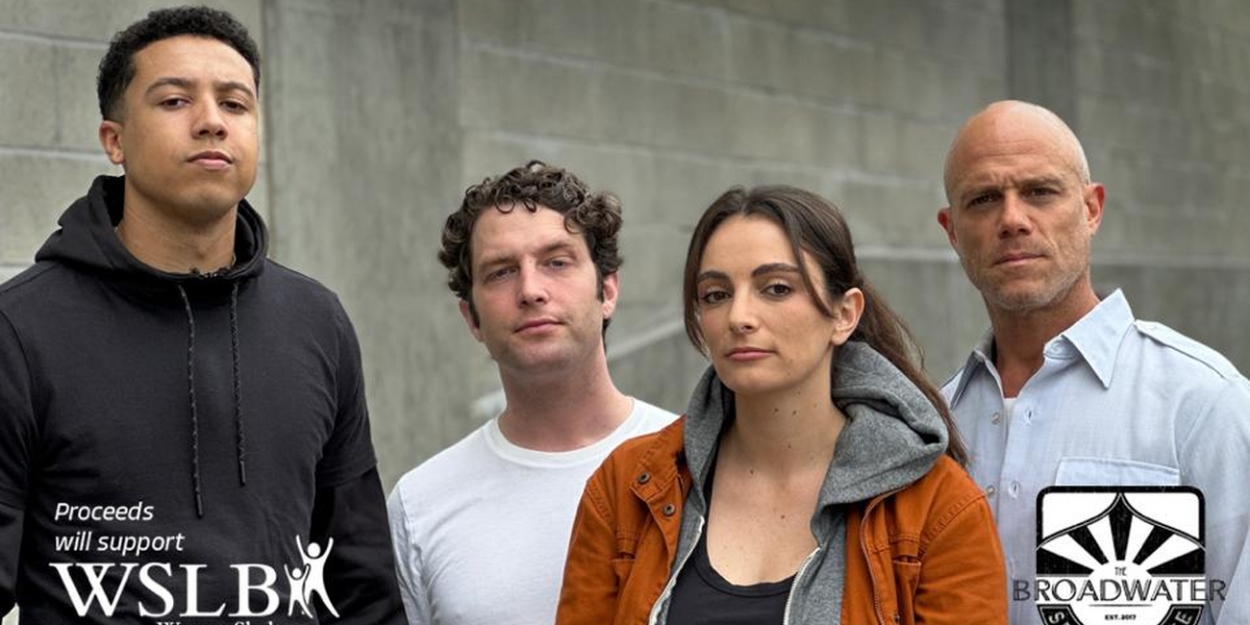
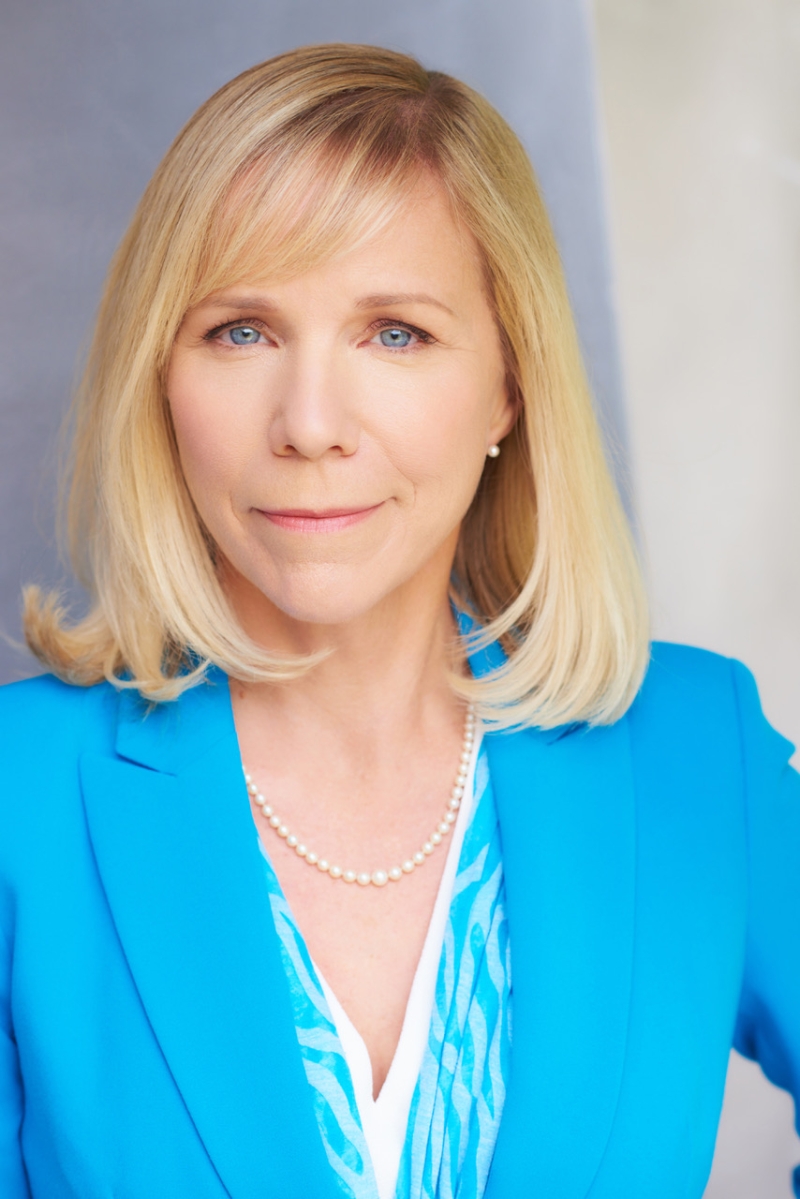
Writer and performer Susan Leslie is probably best known in the theatre world for her long association with writer/director, Del Shores, having appeared in six of his plays. And this month, she will be directing Martyna Majok’s play Ironbound, with three performances July 14-16 at The Broadwater Second Stage. I decided to speak with Susan about her decision to direct this play and why the short run is being presented as a benefit for WomenShelter of Long Beach.
Thanks for speaking with me Susan. For readers unfamiliar with you, tell us about your background in theatre and film.
I was born to a sex therapist and a secret service agent in Oklahoma City … so, you know, a career in comedy was inevitable. After graduating UCLA with a degree in Theater, I performed stand-up comedy, improv comedy, and while I was working in television production for Garry Shandling, I met my long-time acting coach, Howard Fine. It was there that I met the Ironbound producer and cast members. In addition to acting on hundreds of films and TV shows (The Big Bang Theory, Mad Men, The Boys, The Clauses, Avatar, Avengers, X-Men, etc.), I wrote and produced my own one-woman play and worked with Garry Marshall as Chick in his production of Crimes of the Heart. After getting an audition to understudy for Del Shores’ world premiere of Trials and Tribulations of a Trailer Trash Housewife, Del hired me and then continued to cast me in five of his other productions, including writing the role of Timothea for me in his brilliant play Yellow, as well as Jackie in his TV show, Sordid Lives: The Series. Moral of this story, don’t say “no” to being an understudy!
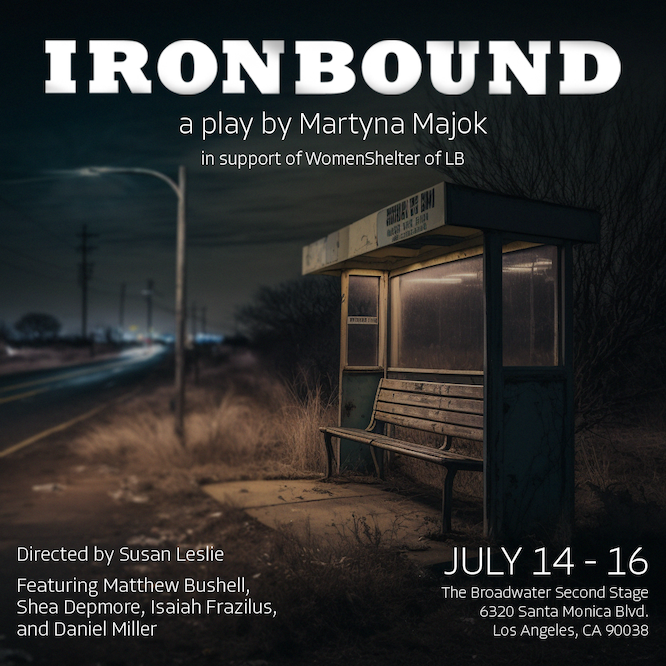
Have you worked on another play by Martyna Majok?
I haven’t worked on any other Martyna Majok plays, but her writing is so incredibly compelling, especially the complexity of her female characters. I’d love to direct Sanctuary City since I work with many immigrant teenagers at a Title 1 public school and this play aligns with many of their stories.
Tell me about the production history of Ironbound, including any awards it has won.
The play was a New York Times Critic's Pick. In 2013, the script won the Smith Prize for Political Theater, a joint commission/award supported and administered by the National New Play Network. It has also won the Aurora Theatre's Global Age Project Prize, the David Calicchio Emerging American Playwright Prize, and the Charles McArthur Award for Outstanding Original New Play or Musical at the 2016 Helen Hayes Awards. At the University of Chicago, Yale School of Drama, and the Juilliard School, Martyna was awarded the 2018 Pulitzer Prize for Drama for her play Cost of Living, which debuted on Broadway last year and was nominated for five 2023 Tony Awards, including Best Play.
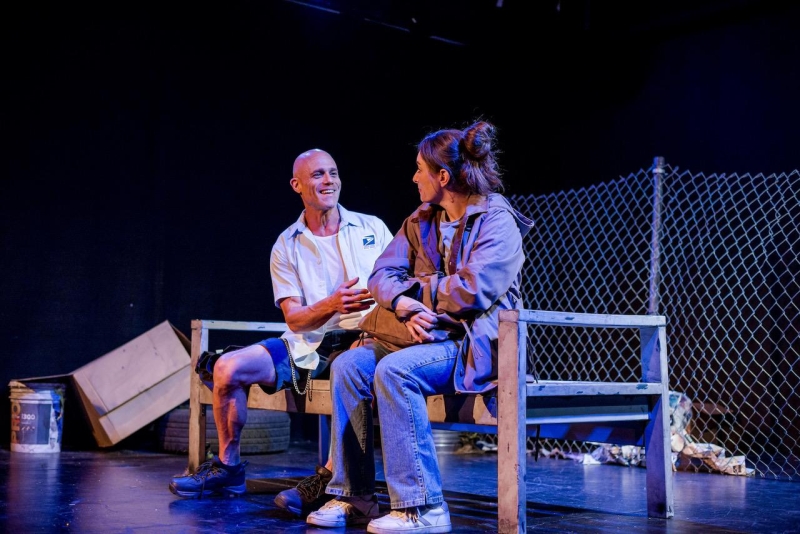
Matt Bushell and Shea Depmore.
Production Photography by Carlos R. Hernandez/Kiyomi Banta
What other plays has Martyna Majok written?
Her other plays include Queens, Sanctuary City, and Cost of Living which have been produced on both American and international stages.
What drew you to want to direct Ironbound?
I first heard about the play when it was at Geffen Playhouse in Los Angeles. The play is gorgeously written with a strong female lead and each character has their own unique story beautifully woven throughout it. Most importantly, it is dramatic and heartbreaking, but it also has a lot of humor. I had worked with our producer, Chandra Bond, on another project and she asked if I wanted to direct Ironbound. I knew the actors involved and I was excited to work with them.

Shea Depmore and Isaiah Frazilus
Production Photography by Carlos R. Hernandez/Kiyomi Banta
Tell me about the play’s story.
At a bus stop in a run-down New Jersey town, Darja, a Polish immigrant cleaning lady, is done talking about feelings; it’s time to talk money. Over the course of 20 years, three relationships, and three presidencies, Darja negotiates for her future with men who can offer her love or security, but never both. It’s a dark, funny, and heartbreaking portrait of a woman for whom love is a luxury, as well as a liability, as she fights to survive in America.
Do you have personal ties to Polish immigrants? And is that what drew you to this play?
I don’t have ties to Polish immigrants. However, I was a mentor in the Big Brothers/Big Sisters of Los Angeles organization and was matched with a 12-year-old girl who had recently immigrated from Eastern Europe. I met with her every weekend for seven years and I became very close with her family. I saw their struggle trying to survive in our country, the challenge of her and her sister trying to learn English, and their desire to fit into the American teenage life. I witnessed them striving for the promise of the American Dream, and that 12-year-old is now in her 30s and we are still very close. The struggle of the lead character, Darja, felt like the struggle this family had to endure, so I was eager to help tell the story of Ironbound.
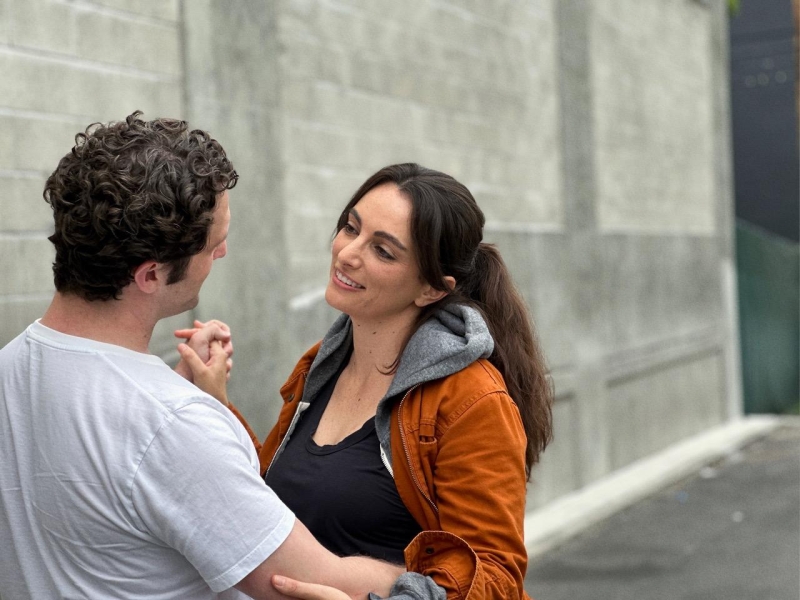
What makes it a good play to present as a benefit to WomenShelter in Long Beach?
In the play, Darja is navigating her relationships with the men in her life. Her first husband leaves her, she is abused by her second husband, and then has a contentious relationship with Tommy, who is cheating on her. The character Vic tells her about a women’s “place” where she can get help and Darja seems surprised these places exist. For some immigrants, due to a cultural or language barrier, they sometimes don’t know that there are women’s shelters that can help them. So, they get stuck in a cycle of abuse happening over and over.
Why is its mission so important to you?
It is important to me because, according to the National Coalition Against Domestic Violence, 20 people per minute are abused by an intimate partner. One in four women have experienced severe domestic abuse. That means most everyone knows at least one person in their life that has been affected by some kind of domestic abuse or violence. So, statistically, a quarter to a third of our audience will have been directly affected.
The lead actress, Shea Depmore, has a direct relationship with WomenShelter of Long Beach because her mother, a Licensed Clinical Social Worker, worked for the shelter for years. So, it was not only thematically a great fit but there was an emotional connection as well.
And since 1977, WomenShelter of Long Beach has helped thousands of families overcome the trauma caused by domestic abuse. WSLB assists victims and their children by providing safe housing and supportive services including an emergency shelter, 24-hour crisis hotline, counseling, social services support, legal and health advocacy, and more.
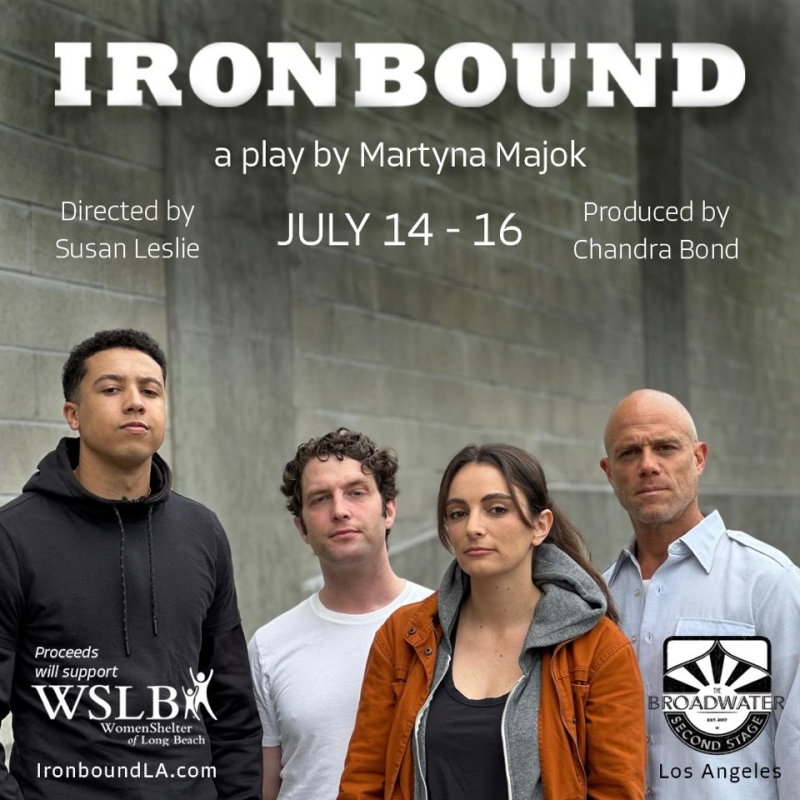
Tell me about the cast members, characters. and how you went about the casting process.
Some of the characters were cast before I was asked to direct. However, I knew the actors well and I was excited to work with them. When it came to casting the character of Vic (the 11th grader) in an intimate theatre, he had to be convincing to play a kid. And since I have a teenager myself, I know what makes an actor believable playing that age. When Isaiah walked into the audition, I said, “That’s our Vic.” Even though the three men in the play have separate scenes with Darja, the four actors are very close and work collaboratively as a team.
Have you worked with any of your production team before? (Scenic design is by Alex Mollo, lighting design is by David Levine, costume design is by Sara Nitikman Parks, and sound design is by Bobby Bruton.)
Scrolling through Facebook one day, I see a post from a theatre friend I hadn’t seen in 20 years. He said his kid had just graduated in scenic design from Emerson, had just won the EVVY Award for outstanding scenic design, and was headed back to Los Angeles to look for work. I reached out and Alex Mollo joined our team the next day. Alex is a brilliant young scenic designer and I’m excited for everyone to see their outstanding work. David Levine and I worked together on another theatre project and he is friends with our producer, Chandra Bond. He is so knowledgeable and creative, and we are lucky he said, “yes.” Chandra also brought Sara Nitikman Parks in as our costume designer, and Bobby Bruton as our sound designer. Roberta Brown is our fight choreographer and a personal friend of mine. She works all over Europe, so we were lucky she had a small hole in her schedule. I had worked with Carlos Hernandez on multiple theatre productions and I brought him on to do our production stills.

Shea Depmore and Daniel Shawn Miller.
Production Photography by Carlos R. Hernandez/Kiyomi Banta
Are you holding discussions during rehearsals about the emotional and/or physical abuse depicted in the play?
We talk a lot about not only the abuse in the play but also the relationship of the men in Darja’s life, including her son, and why she chose those men to marry or live with. Because the actress who plays Darja grew up with her own mother working at a domestic violence shelter, she already had a keen understanding of the emotional and physical toil that women endure in abusive relationships. I learned quite a lot while working with her.
What surprised you the most about the play?
I was surprised by the play’s humor. It’s dark and heartbreaking but it’s also wonderfully funny. Also, as a mom myself, I don’t know why I was surprised by Darja’s incredible survival skills, sacrifice, and negotiating tactics to help her son, but I was. In the play, Tommy says to her, “he (her son) makes you cry.” And even after that, her life revolves around figuring out a way to help him and having that drive steers her to make choices with the men in her life that may not always serve her.
What do you think will have audiences talking about afterward?
I hope that people will think about their own relationships and how any emotional or physical abuse affects them and the other members of their family. I also hope the audience will take away a better understanding about the struggle of immigrants and how the children of immigrants are also affected. People are more than just their accents. Everyone has a story.
What message or call to action do you hope audiences will take away with them?
If you believe you have been a victim of abuse, seek help immediately. There is power in taking action, and sometimes you need assistance to not only take that first step but to sustain the drive to stay out of abusive relationships. There are national and local hotlines in Los Angeles. Start here: http://publichealth.lacounty.gov/dvcouncil/resources/resources.htm
What’s in your production future, either acting or directing?
My own daughter is headed to NYU Tisch in the fall and since I will be an empty nester, I will have more time to devote to the theatre. Since I can’t use my kid’s carpool or time-consuming after-school activities as a reason for procrastinating anymore, I am committed to finishing writing three different plays that are in progress. There is a project I am hoping to direct in summer 2024 and, as an actor, and I just finished voice-over for the fourth season of The Boys.
.png)
Anything else you would like to share?
Please help support WomenShelter of Long Beach by attending Ironbound by Martyna Majok, which I directed, produced by Chandra Bond, that features (in alphabetical order) Matt Bushell, Shea Depmore, Isaiah Frazilus, and Daniel Shawn Miller. Performances will be Friday, July 14, and Saturday, July 15, at 7:30pm, and Sunday, July 16, at 2:30pm at the Broadwater Second Stage, 6320 Santa Monica Blvd. in Hollywood, 90038. Running time is 90 minutes with no intermission. Tickets are $20 and may be purchased online at www.ironboundla.com.
Comments
Videos

